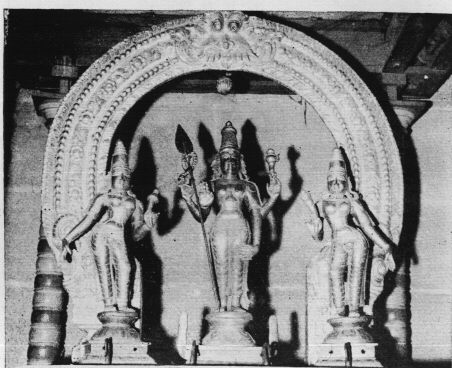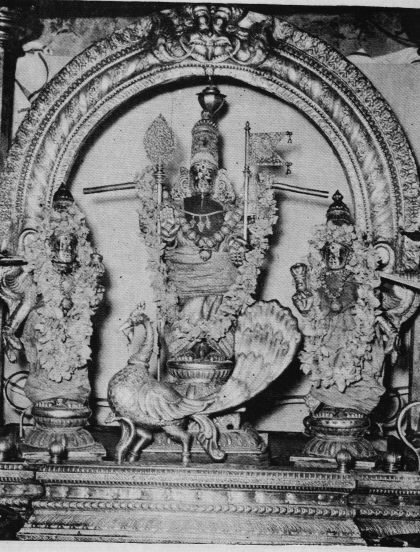| May 1999 Templenet Archives
Encyclopedia of Indian Temples
Indian Temple Architecture
Travel and Tourism (Maps)
Festivals and Fairs
Legends & Beliefs
Glossary of Terms
Templenet - The Ultimate Source of
Information on Indian Temples
Feedback & Information:
webmaster@templenet.com
©1996 K. Kannikeswaran
All Rights Reserved.
Templenet
where
Tradition Meets Technology
|
|

The Significance of Skanda Sashti
- Foreword: Skanda Sashti, the sixth day in the
bright half of the month of Aippasi (Oct 15 - Nov 15), is celebrated in Saivite temples
all over Tamilnadu, and with an extra measure of grandeur in temples dedicated to
Subramanya. Skanda Sashti commemorates the destruction of evil by the Supreme General
Kartikeya, son of Shiva, and is celebrated with the dramatic enactment of Soora Samhaaram.
Mention must be made of the grand celebrations at Tirupparankunram,
Tiruchendur, two of the 6 'Padai Veedu' temples of Murugan. At Sikkal, the festival image of Subramanya receives a spear,
from the Ambal shrine, and breaks out in sweat, a day before the climax of the festival. Vijay
Raghavan, in this article explores the background of
this festival.
 Skanda: Skanda is an
ancient deity mentioned in stone inscriptions and shown on coins ( 1st cent.
To 5th cent CE) . The story of Skanda is found among others in the Mahabharatha, Siva
Purana and is retold in Kalidasa's Kumara Sambhavam. Chandogya Upanishad
identifies Skanda as Sanat Kumara. In Tamil, Arunagiri's Thiruppugazh,
Nakkeerar's Thiru Murugaatrupadai, and scores of other literatures praise the glory Skanda: Skanda is an
ancient deity mentioned in stone inscriptions and shown on coins ( 1st cent.
To 5th cent CE) . The story of Skanda is found among others in the Mahabharatha, Siva
Purana and is retold in Kalidasa's Kumara Sambhavam. Chandogya Upanishad
identifies Skanda as Sanat Kumara. In Tamil, Arunagiri's Thiruppugazh,
Nakkeerar's Thiru Murugaatrupadai, and scores of other literatures praise the glory
of Muruga in devotional poetry.
-
- The Story of Skanda Shasti is the story of the birth of Skanda or
Kumara and the fulfillment of the purpose of His divine incarnation. "Tormented by
the asura ( demon/anti God) Tarakasura, the devas with Indra at their head went to
the world of the self born the creator" (Kumara Sambhava 2.1) The creator said
" only the spark of Shiva can produce the hero who will defeat the powers of
the evil" Unfortunately, Shiva The king of yogis was lost in a deep state of
meditation and samadhi. None of the Devas dared to disturb him... least of all
convince him to create a progeny.
-
- Upon Brahma's suggestion, they sought the help of Parvathi and Kama (the god of
love). Parvathi agreed to help and engaged herself in severe penance to attract
Shiva's attention. Kama also agreed to help and engaged himself in the suicidal
mission of arousing Shiva from His state of Samadhi. Kama shot his arrows of love at
Shiva who was eventually disturbed and the fire of anger from his third eye burnt Kama
into ashes.
-
- The penance of Parvathi and the sacrifice of Kama paid off. Shiva was aroused from his
Samadhi. However, none could bear the sparks of His fiery seed. It fell into the
mouth of Agni, and afterwards received by Ganges, who in turn threw it into Sara
Vana ( forest of arrow like grass). Thus Saravanabava was born. He was also
Skanda - Shiva's power of chastity preserved through penance. Skanda was raised by
the six mothers of the divine constellation of Krithikai (pleiades) . Karthikeya
divided himself into six babies to be
nursed by six mothers. When Parvathi came and gathered all the six babies, He became
Shanmukha - the one with the six faces and one body.
-
- Shanmukha became Kumara - the powerful virile adolescent who was also the
beautiful and the handsome ( Muruga) . He was made the General (Deva Senapathi) of
the God's army. "....Of the army generals I am Skanda."..(The Gita).
Skanda received from his mother Parasakthi an all powerful Vel (lance). Hence He is
also Sakthi Velan. He engaged the armies of Simhamukha, Surapadman and Tarakasura on a six
day battle and vanquished all of them on the sixth day. The Asuras were
annihilated and the Devas were liberated. The sixth day (Sashti) of the waxing moon (
sukhla) in the month of Ashada ( Oct/Nov) is celebrated as Skandha Sashti.
Indra was restored to his kingdom and gave his daughter Deivayanai or Devasena in marriage to Skanda. In order not to discriminate between the rich and
the poor, Muruga also married Valli the gypsy damsel. marriage to Skanda. In order not to discriminate between the rich and
the poor, Muruga also married Valli the gypsy damsel.
- Skanda Sashti Celebrations
Corresponding to the six days of the war over the evil forces, devotees undertake
fasts, prayers and devotional singing to Lord Muruga. Most of the devotees stay in
the temples during these six days. In Tiruchendur and Tiruparankundram events
leading to the conquest of the Asuras are dramatized and enacted. Offering of Kavadi
on Skanda Sashti is a form of popular worship.
According to Swami Sivananda " the Lord spent His childhood in Tiruchendur and
took Mahasamadhi at Kathirgamam. If anyone goes to Kathirgamam (Sri Lanka) with
faith, devotion and piety, and stays in the temple for two or three days , the Lord
Himself grants His vision to the devotee."
-
-
|